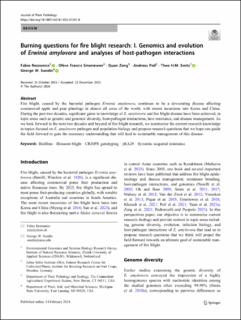Please use this identifier to cite or link to this item:
https://doi.org/10.21256/zhaw-30101| Publication type: | Article in scientific journal |
| Type of review: | Peer review (publication) |
| Title: | Burning questions for fire blight research : I. Genomics and evolution of Erwinia amylovora and analyses of host-pathogen interactions |
| Authors: | Rezzonico, Fabio Emeriewen, Ofere Francis Zeng, Quan Peil, Andreas Smits, Theo H.M. Sundin, George W. |
| et. al: | No |
| DOI: | 10.1007/s42161-023-01581-0 10.21256/zhaw-30101 |
| Published in: | Journal of Plant Pathology |
| Issue Date: | 14-Feb-2024 |
| Publisher / Ed. Institution: | Springer |
| ISSN: | 1125-4653 2239-7264 |
| Language: | English |
| Subjects: | Biofilm; Blossom blight; pEA29; CRISPR genotyping; Systemic acquired resistance |
| Subject (DDC): | 572: Biochemistry 632: Plant diseases, pests |
| Abstract: | Fire blight, caused by the bacterial pathogen Erwinia amylovora, continues to be a devastating disease affecting commercial apple and pear plantings in almost all areas of the world, with recent incursions into Korea and China. During the past two decades, significant gains in knowledge of E. amylovora and fire blight disease have been achieved, in topic areas such as genetic and genomic diversity, host-pathogen interactions, host resistance, and disease management. As we look forward to the next two decades and beyond of fire blight research, we summarize the current research knowledge in topics focused on E. amylovora pathogen and population biology and propose research questions that we hope can guide the field forward to gain the necessary understanding that will lead to sustainable management of this disease. |
| URI: | https://digitalcollection.zhaw.ch/handle/11475/30101 |
| Fulltext version: | Published version |
| License (according to publishing contract): | CC BY 4.0: Attribution 4.0 International |
| Departement: | Life Sciences and Facility Management |
| Organisational Unit: | Institute of Natural Resource Sciences (IUNR) |
| Published as part of the ZHAW project: | Schutz von Apfelwälderökosystemen in Zentralasien vor dem bakteriellen Pathogen Erwinia amylovora (Feuerbrand) |
| Appears in collections: | Publikationen Life Sciences und Facility Management |
Files in This Item:
| File | Description | Size | Format | |
|---|---|---|---|---|
| 2024_Rezzonico-etal_Burning-questions-in-fire-blight-research.pdf | 1.45 MB | Adobe PDF |  View/Open |
Show full item record
Rezzonico, F., Emeriewen, O. F., Zeng, Q., Peil, A., Smits, T. H. M., & Sundin, G. W. (2024). Burning questions for fire blight research : I. Genomics and evolution of Erwinia amylovora and analyses of host-pathogen interactions. Journal of Plant Pathology. https://doi.org/10.1007/s42161-023-01581-0
Rezzonico, F. et al. (2024) ‘Burning questions for fire blight research : I. Genomics and evolution of Erwinia amylovora and analyses of host-pathogen interactions’, Journal of Plant Pathology [Preprint]. Available at: https://doi.org/10.1007/s42161-023-01581-0.
F. Rezzonico, O. F. Emeriewen, Q. Zeng, A. Peil, T. H. M. Smits, and G. W. Sundin, “Burning questions for fire blight research : I. Genomics and evolution of Erwinia amylovora and analyses of host-pathogen interactions,” Journal of Plant Pathology, Feb. 2024, doi: 10.1007/s42161-023-01581-0.
REZZONICO, Fabio, Ofere Francis EMERIEWEN, Quan ZENG, Andreas PEIL, Theo H.M. SMITS und George W. SUNDIN, 2024. Burning questions for fire blight research : I. Genomics and evolution of Erwinia amylovora and analyses of host-pathogen interactions. Journal of Plant Pathology. 14 Februar 2024. DOI 10.1007/s42161-023-01581-0
Rezzonico, Fabio, Ofere Francis Emeriewen, Quan Zeng, Andreas Peil, Theo H.M. Smits, and George W. Sundin. 2024. “Burning Questions for Fire Blight Research : I. Genomics and Evolution of Erwinia Amylovora and Analyses of Host-Pathogen Interactions.” Journal of Plant Pathology, February. https://doi.org/10.1007/s42161-023-01581-0.
Rezzonico, Fabio, et al. “Burning Questions for Fire Blight Research : I. Genomics and Evolution of Erwinia Amylovora and Analyses of Host-Pathogen Interactions.” Journal of Plant Pathology, Feb. 2024, https://doi.org/10.1007/s42161-023-01581-0.
Items in DSpace are protected by copyright, with all rights reserved, unless otherwise indicated.